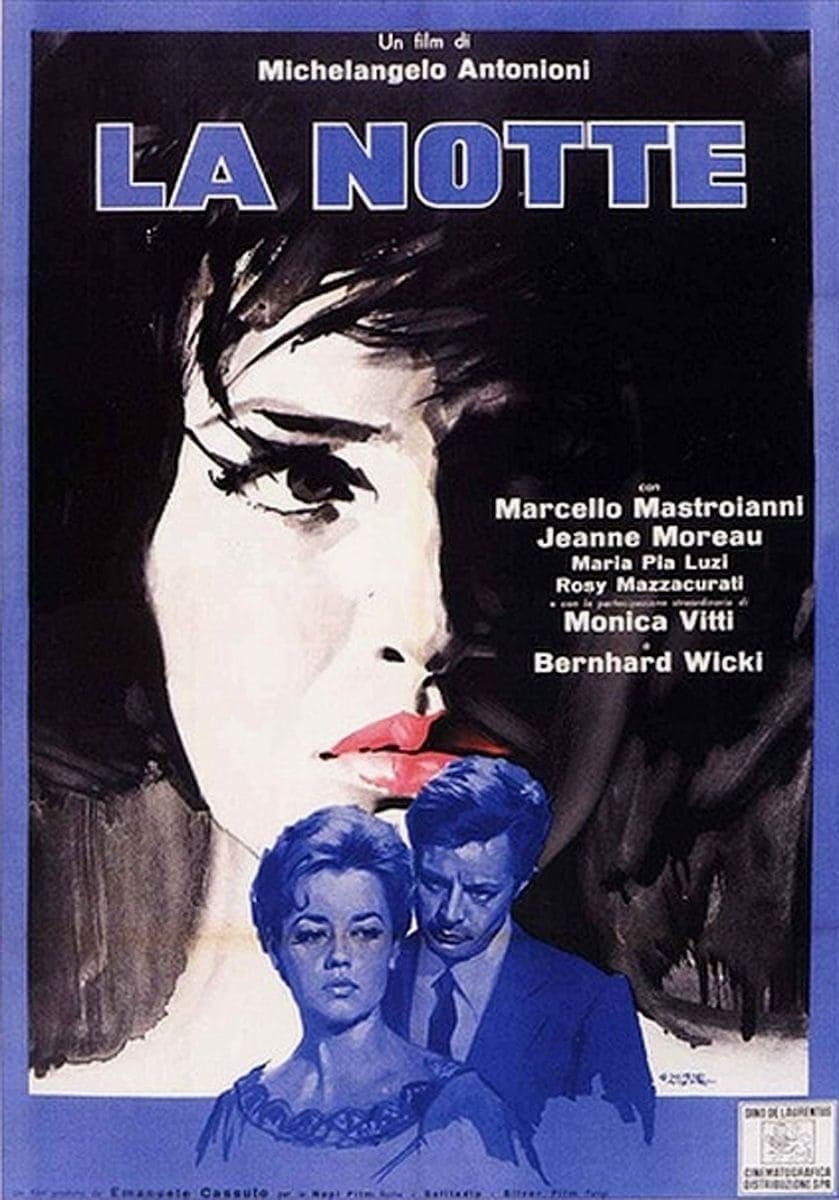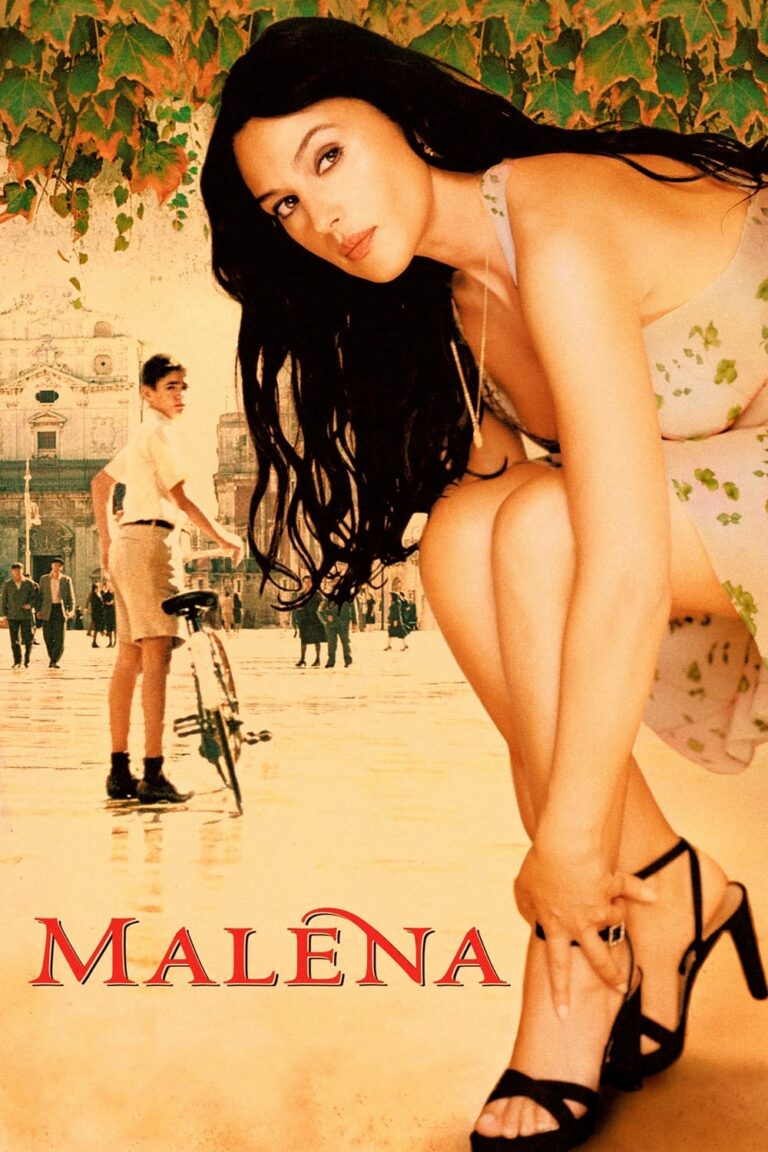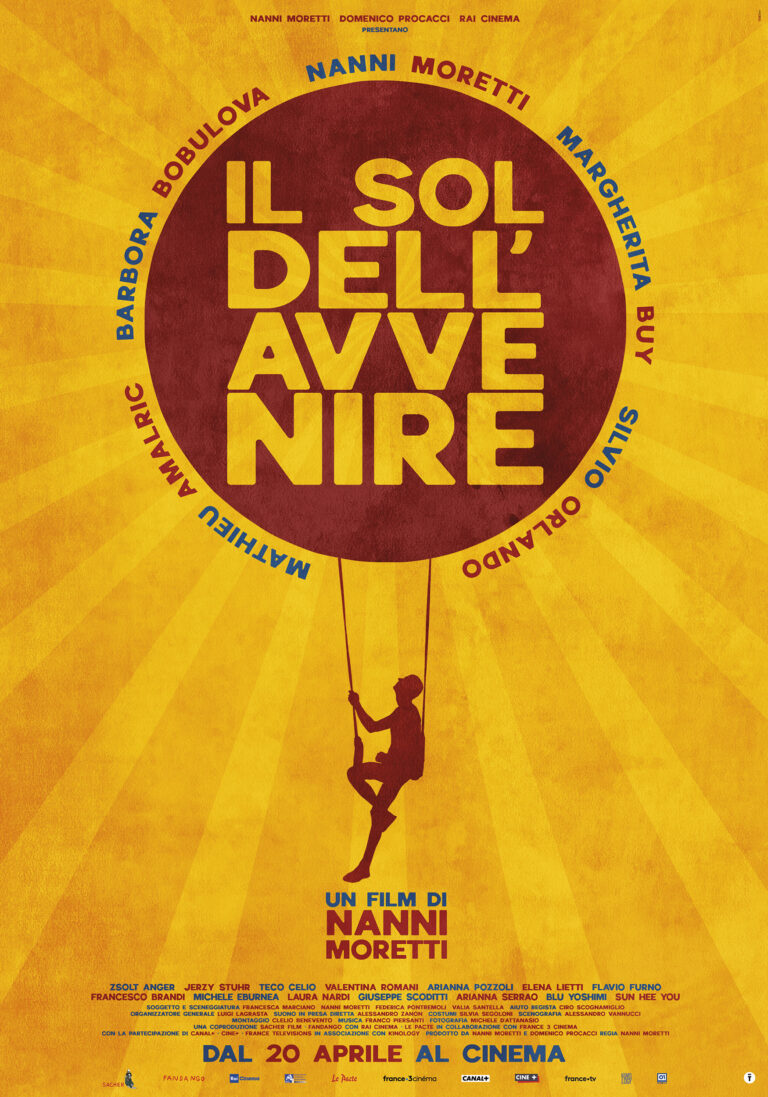
Michelangelo Antonioni’s La Notte (1961) stands as a monumental achievement in cinema history, blending visual poetry with an existential exploration of modern relationships. As the second entry in Antonioni’s celebrated trilogy on alienation (L’Avventura, La Notte, and L’Eclisse), this film encapsulates the disconnection, ennui, and fragmented emotional ties that define the human condition in the face of modernity.
With an all-star cast led by Marcello Mastroianni, Jeanne Moreau, and Monica Vitti, La Notte transforms the simple premise of a day and night in the life of a married couple into a profound meditation on love, ambition, and the inevitable erosion of intimacy. Its understated elegance, intricate narrative, and breathtaking cinematography make it a masterpiece that resonates across decades.
The Context of La Notte: A Film Born from Its Time
Released during Italy’s postwar economic boom, La Notte captures the tension between societal progress and personal discontent. The Italian neorealist tradition had begun to evolve by the late 1950s, and Antonioni played a pivotal role in this transition. His films moved away from overtly political themes to explore the inner lives of his characters, a shift that marked a profound evolution in European cinema.
La Notte premiered at the Berlin International Film Festival, where it won the Golden Bear. Yet, beyond accolades, the film captured the zeitgeist of an era grappling with existential questions. It reflected the challenges of a world increasingly defined by industrialization, urbanization, and shifting social norms—factors that weighed heavily on relationships and individual identity.
The Plot: A Day and Night of Disconnection
The narrative follows Giovanni Pontano (Marcello Mastroianni), a successful author, and his wife, Lidia (Jeanne Moreau), over the course of 24 hours. The day begins with a hospital visit to a dying friend, setting a somber tone. Lidia’s evident emotional detachment and Giovanni’s flirtations with other women foreshadow the deep cracks in their marriage.
As the couple navigates Milan’s urban landscape, they drift further apart, both physically and emotionally. Lidia roams the city streets, seeking solace in solitude, while Giovanni indulges in superficial interactions. The film culminates at an extravagant party hosted by a wealthy industrialist, where the glamorous Monica Vitti appears as Valentina, the enigmatic young woman who temporarily captures Giovanni’s attention.
Yet, despite the distractions, the night ends in despair. Alone together in a desolate field, Giovanni and Lidia confront the emptiness of their relationship. Their mutual inability to rekindle passion or meaning leaves the audience with an aching sense of unresolved alienation.
Visual Language and Cinematic Style
Antonioni’s signature style is on full display in La Notte. The film is a masterclass in visual storytelling, with the cinematography by Gianni Di Venanzo capturing the sterile beauty of Milan’s modern architecture and the emotional desolation of its characters.
Antonioni’s use of long takes and carefully composed frames allows the audience to linger in the moment, mirroring the characters’ introspection. The camera frequently captures Giovanni and Lidia in isolation, even when they share the same space, underscoring their emotional distance. Shadows, reflections, and the interplay of light and dark serve as metaphors for the inner turmoil simmering beneath their polished exteriors.
Themes of Alienation and Modernity
At its core, La Notte is a profound exploration of alienation—both personal and societal. The film dissects the impact of modernity on human relationships, particularly the ways in which material success and societal expectations can erode intimacy.
Giovanni, though professionally accomplished, is spiritually hollow, while Lidia’s restlessness reflects her unfulfilled emotional needs. Their inability to connect mirrors the larger existential crisis of the modern individual, caught between the promises of progress and the reality of isolation.
Another significant theme is the role of memory and time. Lidia’s nostalgia for their early days of love contrasts sharply with the present, where passion has given way to apathy. This juxtaposition heightens the tragic inevitability of their emotional estrangement.
Performances that Resonate
The performances in La Notte elevate its narrative depth. Marcello Mastroianni, known for his charm and charisma, delivers a subdued yet powerful portrayal of Giovanni. His character’s quiet desperation and moral ambiguity make him both relatable and frustrating.
Jeanne Moreau’s performance as Lidia is hauntingly beautiful. Her subtle expressions and physicality convey a complex mix of sadness, anger, and resignation. Meanwhile, Monica Vitti brings a magnetic presence to Valentina, her character serving as a foil to the Pontanos’ disillusionment.
Together, the trio creates a nuanced emotional tapestry, drawing the audience into the intricate dynamics of their interactions.
The Ending: A Portrait of Ambiguity
The film’s ambiguous ending is quintessential Antonioni. Rather than offering closure, La Notte leaves viewers with questions about the nature of love, connection, and personal fulfillment. Giovanni and Lidia’s final conversation, in which she reads an old love letter he once wrote to her, is devastating in its simplicity.
The letter, a relic of their past passion, starkly contrasts with the present. Giovanni’s inability to recognize his own words underscores the depth of their emotional disconnection. Yet, the film avoids overt despair, leaving space for reflection and interpretation.
The Legacy of La Notte
More than six decades after its release, La Notte remains a touchstone in art cinema. Its themes of alienation and existential longing continue to resonate, making it a timeless exploration of the human condition. The film’s influence can be seen in the works of directors like Ingmar Bergman, Wong Kar-wai, and Sofia Coppola, all of whom have drawn inspiration from Antonioni’s meditative approach to storytelling.
Moreover, La Notte challenges audiences to engage deeply with its characters and themes. It is not a film that offers easy answers or tidy resolutions. Instead, it invites viewers to grapple with their own experiences of love, loss, and the search for meaning.
Why La Notte Still Matters Today
In an era dominated by fast-paced storytelling and instant gratification, La Notte serves as a reminder of the power of slow cinema. Its deliberate pacing and focus on subtle emotional shifts encourage a deeper level of engagement, both intellectual and emotional.
The film’s exploration of alienation in modern relationships feels as relevant today as it did in 1961. In a world increasingly shaped by technology and social disconnection, the struggles of Giovanni and Lidia offer a poignant reflection of our own challenges in finding genuine connection.
FAQs
What makes La Notte a masterpiece?
La Notte combines visual poetry, nuanced performances, and profound themes to create a timeless exploration of human relationships and existential longing.
How does Antonioni depict alienation in La Notte?
Antonioni uses visual metaphors, spatial compositions, and the emotional distance between characters to reflect the alienation experienced by modern individuals.
Why is the ending of La Notte significant?
The ambiguous ending highlights the unresolved nature of Giovanni and Lidia’s relationship, encouraging viewers to reflect on the fragility of love and connection.
What is the role of Milan’s architecture in the film?
The urban landscape serves as a backdrop that mirrors the emotional sterility and fragmentation of the characters’ lives.
How does La Notte fit into Antonioni’s trilogy on alienation?
As the second film in the trilogy, La Notte deepens Antonioni’s exploration of disconnection and existential crisis, bridging the narrative and thematic elements of L’Avventura and L’Eclisse.
Why should modern audiences watch La Notte?
The film’s timeless themes and stunning cinematography offer a meditative experience that resonates with contemporary concerns about love, ambition, and identity.
Conclusion
Michelangelo Antonioni’s La Notte is more than just a film; it is a profound artistic statement on the complexities of modern life. Through its exquisite visuals, haunting performances, and existential themes, the film continues to captivate and challenge audiences. For those willing to immerse themselves in its deliberate pace and rich subtext, La Notte offers a cinematic experience of unparalleled depth and beauty.





